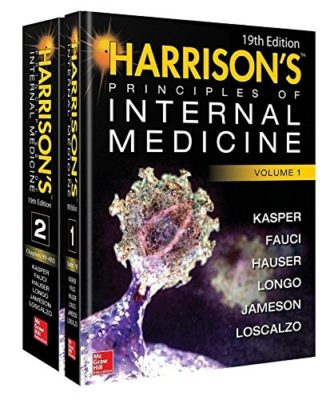The Editors are pleased to present the 19th edition of Harrison’s Principles of Internal Medicine. Since the first edition was published 65 years ago, virtually every area of medicine and medical education has evolved remarkably, and many new fields have emerged. While retaining the founding goals of Harrison’s, this edition has been modified extensively in light of the varied needs of the book’s readers and the diverse methods and formats by which information is now acquired and applied. The focus of medical education worldwide is shifting from the classic structure/function/disease approach to an integrated, often case-based approach in which basic and population sciences are specifically linked to the practical diagnosis and management of disease. Many of the updates and changes described here have been undertaken with the modern educational and clinical environments in mind. This new edition offers a thoroughly updated presentation of the classic pathophysiologic basis of clinical medicine and details the cutting-edge methods and tools that are now available for the assessment of symptoms and the effective management of diseases in the modern patient-care environment. The text is supplemented by germane new photographs, radiographs, illustrations, atlases, patient-care algorithms, tables, and practical demonstrative videos. In the interest of producing the most practical format possible for the 19th edition, a new system of referencing has been used.
Detailed bibliographic listings, with summaries of articles’ relevance to practice, appear in the online edition, replacing the general and limited collection of Suggested Readings that appeared in the prior print editions. The 19th edition of Harrison’s is designed for accessibility and flexibility. The print textbook is available in two volumes. Volume 1 focuses on the foundations of medicine and the understanding and assessment of cardinal disease manifestations; Volume 2 focuses on specific diseases, by system. This functional division will be helpful to students who are mastering the basis of clinical medicine and to clinicians who are more focused on gaining an advanced understanding of mechanisms and patient care in specific diseases. In terms of digital media, Harrison’s is now available as an eBook on multiple platforms, as an enhanced “app” developed especially for tablet and smartphone devices that offer high-definition resolution of multimedia content and interactive features, and as an updated online edition. All of these options provide access to our numerous e-chapters as well as to videos and atlases. Additional resources include the Harrison’s Self-Assessment and Board Review, a useful study guide based on information in the 19th edition, and the Harrison’s Manual of Medicine, a pocket version of Harrison’s Principles of Internal Medicine. A new Harrison’s collection of case vignettes emphasizing differential diagnostic considerations in the assessment of cardinal manifestations will also be available. Advances in medical science have been spectacular since Harrison’s was first published in 1949.
